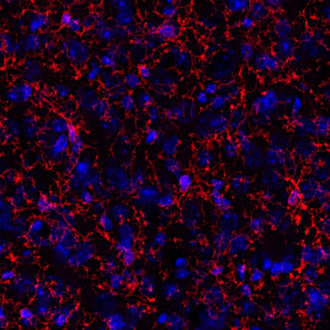
| Cat. No. 476 011 |
100 µg purified IgG, lyophilized. Albumin and azide were added for stabilization. For reconstitution add 100 µl H2O to get a 1mg/ml solution in PBS. Then aliquot and store at -20°C to -80°C until use. Antibodies should be stored at +4°C when still lyophilized. Do not freeze! |
| Applications | |
| Clone | SY-341D12 |
| Subtype | IgG2b (κ light chain) |
| Immunogen | Synthetic peptide corresponding to residues near the carboxy terminus of ms P2Y12 receptor (UniProt Id: Q9CPV9) |
| Reactivity |
Reacts with: mouse (Q9CPV9). No signal: rat (Q9EPX4), human (Q9H244). Other species not tested yet. |
| Specificity | K.O. validated |
| Remarks |
IHC: Antigen retrieval with citrate buffer pH 6 is tolerated. |
| Data sheet | 476_011.pdf |

P2Y12 receptor (P2RY12) is a Gi – coupled purinoceptor and is of particular relevance for microglia in the central nervous system (CNS) (1). The preferred agonist is ADP, the degradation product of ATP, which is released from neurons and other glial cells during physiological activity or after tissue damage. P2Y12 receptor is highly expressed in processes and somata of surveilling microglia and plays a major role in microglial chemotaxis in response to local CNS injury (2). More recently, P2Y12 receptors have been shown to be concentrated at microglia process-neuronal somata contacts (3) and to be critical for neuroprotection. To date, P2Y12 receptor is one of the most accepted microglia-specific markers used to distinguish CNS-resident microglia from CNS-associated macrophages (CAMs) and infiltrating monocytes/macrophages (4). The expression level of P2Y12 receptor is downregulated in an activated state of microglia referred to as disease-associated microglia (DAM). In the periphery, P2Y12 receptor is expressed in platelets and is a well-known biological target for anti-thrombotic drugs due to its central role in platelet activation, aggregation and blood clotting (5).